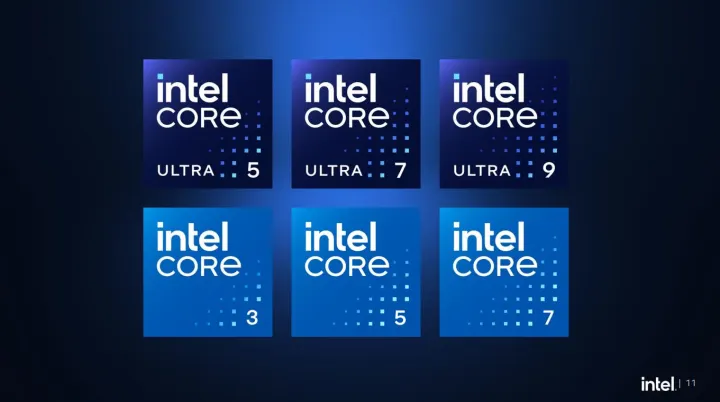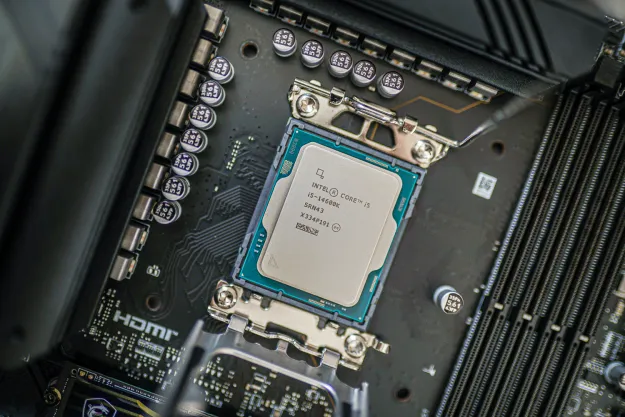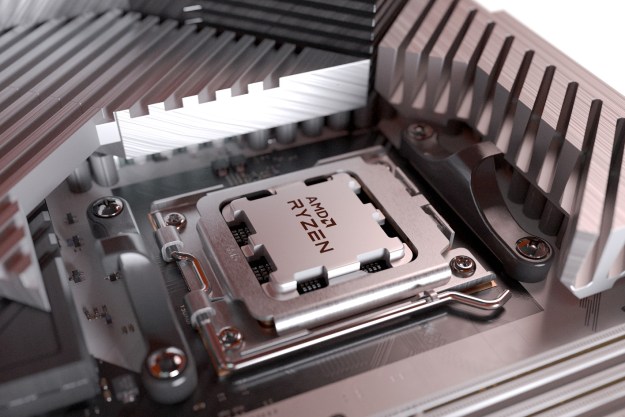
Intel has just made a pretty significant announcement — it’s rebranding its processors. Starting with Meteor Lake CPUs, Intel’s consumer processors will bear a new name: Intel Core and Intel Core Ultra. Even more head-turning, Intel will also drop the iconic “i” in its naming scheme.
The change might seem subtle on the surface, but it says something meaningful about the state of the industry and Intel’s role in it. For so many years, Intel’s commanding lead in the processor world meant its competitors were the ones mimicking its approach to product names and marketing — AMD, most obviously.
But with this new naming convention, Intel is adopting a bit of a blend of what AMD and Apple are doing. For the first time in a long time, Intel is chasing its competitors instead of leading the pack. It’s an admission that we’ve entered a new epoch — one where Intel’s brand might not mean what it used to for the average buyer.
Intel is also dropping mentions of generation.
With the new branding, Intel is focusing on the “Core” part of the naming scheme and drops the “i” from processor tiers like i3 and i9. As such, a CPU that would have previously been called “Intel Core i5-14600K” will now become “Intel Core 5 14600K.”
Overall, the tiering will still be split into 3/5/7/9, just like AMD Ryzen CPUs, but the “i” is now gone.
That’s not all of it, though. Intel is now trying to further emphasize the difference between its mainstream chips and the high-end segment. From now on, Intel’s future CPUs will either belong to the Intel Core family or the Intel Core Ultra family, not unlike Apple’s Pro, Max, and Ultra tiers.
Of course, this is Intel, so there’s some overlap between the two lines, as the Core and Core Ultra both have tier 5 and 7 chips. It’s a little confusing, but the general idea is that the Core Ultra chips offer premium performance. Intel hasn’t explained how overclocking fits into that, but Tom’s Hardware notes that a chip won’t need to belong to the current K-series in order to be branded as Intel Core Ultra.
Intel is also dropping mentions of generation. Before, we’d often see Intel refer to its CPUs as, for example, “Intel 13th Generation Core i9-13900K Processor.” Now, we’ll have to rely on the numbers after the tier to tell the generation.

The company also states that it prefers for the processor number to follow the word “processor.” As such, the full name of a next-gen CPU would now be Intel Core Ultra 7 Processor 14700K. It’s safe to assume that most people will drop the “processor” much the way Intel dropped the “i,” though. We’ll start seeing references to Core Ultra 7 14700K instead.
These changes don’t apply retroactively, so all the Raptor Lake (and older) chips that we already know are sticking to the old naming convention. However, it’s unclear what exactly will happen to Intel’s new products. After all, we’re expecting Meteor Lake for mobile first, and desktop users are most likely only getting a Raptor Lake refresh.
It’s a bold move for Intel to change its tried-and-true branding. We saw it coming over a month ago, and yet, it still feels like it’ll take some getting used to. I won’t blame them for wanting to stay current, and maybe the willingness to shift directions is a positive sign for the company. After all, the last thing a company wants is to appear stodgy and old-school.
The changes won’t leave Intel’s products unrecognizable, but it certainly indicates we’ve entered a new era in the world of processors — and Intel clearly isn’t the one defining it.
Editors' Recommendations
- It just became the perfect time to buy a last-gen Intel CPU
- Gamers are reportedly returning Intel Core i9 CPUs in droves
- The only Intel CPU you should buy is over a year old
- Everything we know about Lunar Lake, Intel’s big next-generation chips
- Reviewers agree: Intel’s latest chip is truly ridiculous




